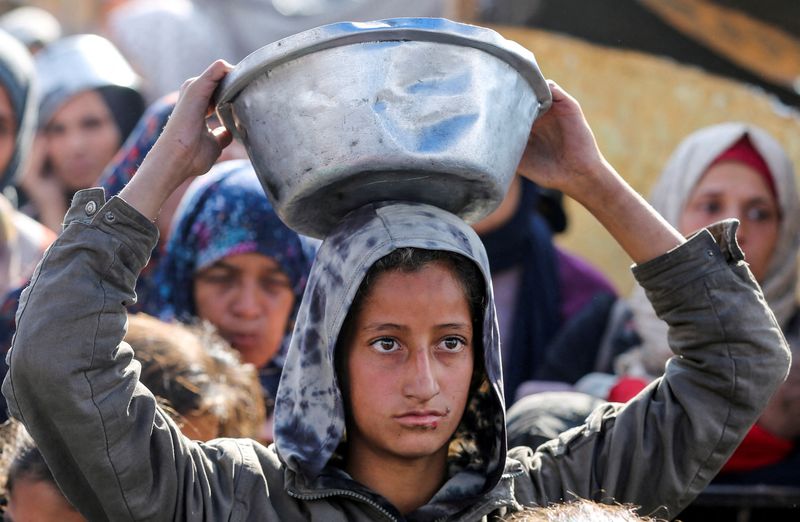
By Alexander Cornwell and Nidal al-Mughrabi
JERUSALEM/CAIRO (Reuters) – Israel’s cabinet has approved a deal with the Palestinian militant group Hamas for a ceasefire and the release of hostages in the Gaza Strip, Prime Minister Benjamin Netanyahu’s office said on Saturday, a day before the scheduled start of the agreement.
In the early hours of Saturday after meeting for more than six hours, the government approved a deal that could pave the way for an end to the 15-month war in the Palestinian enclave, which is controlled by Hamas.
“The Government has approved the framework for the return of the captives. The framework for the release of the captives will be effective on Sunday,” Netanyahu’s office said in a brief statement.
In Gaza, Israeli warplanes have continued heavy attacks since the ceasefire agreement was agreed. Gaza medics said an Israeli airstrike early Saturday killed five people in a tent in the Mawasi area west of Khan Younis in the south of the enclave.
This brings to 119 the number of Palestinians killed in Israeli airstrikes since the agreement was announced on Wednesday.
After the Israeli cabinet’s approval, top US negotiator Brett McGurk said the plan was moving forward.
The ceasefire will begin at 0630 GMT on Sunday, the Qatari foreign ministry spokesman posted on X. The White House expects the three female hostages to be released to Israel in the afternoon through the Red Cross.
“We have locked down every single detail of this agreement. We are very confident … it will be ready to go into effect on Sunday,” McGurk told CNN from the White House.
Under the agreement, the three-phase cease-fire will begin with an initial six-week phase when hostages held by Hamas will be exchanged for prisoners and detainees held by Israel.
Thirty-three of the 98 remaining Israeli hostages, including women, children, men over 50 and sick and wounded captives, will be released at this stage. In return, Israel will release nearly 2,000 Palestinians from its prisons.
It included 737 men, women and teenage prisoners, some of whom were members of Palestinian militant groups convicted of attacks that killed dozens of Israelis, as well as hundreds of others. Palestinians from Gaza who have been imprisoned since the start of the war.
The Israeli Justice Ministry published its details early Saturday, along with the ceasefire agreement, saying 30 Palestinian prisoners would be released for each female hostage on Sunday.
After Sunday’s hostage release, McGurk said, the agreement called for four more female hostages to be released after seven days, followed by the release of three additional hostages every seven days after that. .
HARD-LINERS AGAINST CEASEFIRE
With the deal bitterly opposed by some hard-liners in the Israeli cabinet, media reports said 24 ministers in Netanyahu’s coalition government voted in favor of the deal while eight opposed it.
Opponents said the cease-fire agreement represented a capitulation to Hamas. National Security Minister Itamar Ben-Gvir threatened to resign if it was approved and urged other ministers to vote against it. However, he said that he will not bring down the government.
His fellow hard-liner, Finance Minister Bezalel Smotrich, has also threatened to quit the government if it does not return to war to defeat Hamas after the first six-week phase of the ceasefire.
After a last-minute delay on Thursday that Israel blamed on Hamas, Israel’s security cabinet voted Friday in favor of the cease-fire agreement, a requirement before the full cabinet vote.
Israel began its attack on Hamas in Gaza after the group’s fighters invaded Israel on Oct. 7, 2023, which killed about 1,200 people and took 250 hostages, according to Israeli tallies.
The war between Israeli forces and Hamas has destroyed much of urbanized Gaza, killed more than 46,000 people and displaced most of the enclave’s pre-war population of 2.3 million several times, according to authorities in Gaza.
If successful, the cease-fire could ease hostilities elsewhere in the Middle East, where hostilities have spread to include Iran and its proxies – Lebanon’s Hezbollah, Yemen’s Houthis and Iraqi armed groups – as well as the -occupied West Bank.
Civilians in Gaza are facing a humanitarian crisis due to hunger, cold and disease. The cease-fire agreement calls for an influx of aid, and international organizations have aid trucks lined up at Gaza’s borders to bring in food, fuel, medicine and other essential supplies.
The Palestinian aid agency UNRWA said on Friday that it had 4,000 trucks full of aid, half of it food, ready to enter the coast.

Palestinians waiting for food in the southern Gaza Strip on Friday said they hoped a truce would mean an end to hours of queuing to fill a plate.
“I hope it happens so that we can cook in our homes and make whatever food we want, without having to go to soup kitchens and exhaust ourselves for three or four hours trying to get (food) – sometimes can’t even do it at home,” said Palestinian Reeham Sheikh al-Eid.








